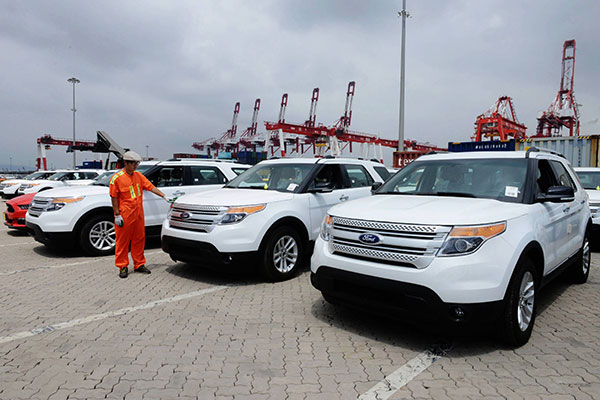China 'accelerates' plan to boost market for parallel-import autos
By DU XIAOYING (China Daily) Updated: 2015-07-27 11:19
|
 |
|
Imported cars at the Port of Qingdao Bonded Area in Shandong province. Despite flagging sales for "parallel import" cars, the central government is trying to accelerate pilot programs that would allow auto dealers in China to directly import vehicles from foreign production bases. [Photo/China Daily] |
With sales stagnant, authorities launch series of programs
Despite flagging sales in China's parallel-import autos, the nation's policymakers are pushing harder than ever to advance pilot programs in support of the market.
The Ministry of Commerce, along with other government departments, is keen to accelerate a series of pilot programs for parallel-import autos, said Wang Shouwen, vice-minister of commerce, earlier this month.
In addition to the Shanghai free trade zone, where Chinese auto dealers have been importing and selling parallel-import cars since the beginning of the year, policymakers have tabbed Shenzhen's Qianhai commercial development zone, Fujian province and Tianjin to pilot their own parallel-import auto programs, Wang said.
The plan to launch the programs is part of the ministry's greater overall effort to boost trade in the country.
The parallel-import program will allow independent auto dealers to directly import genuine vehicles from a foreign production base, a gray market that has existed in China for years.
The price for such an auto is about 10 to 20 percent lower than that from authorized dealers.
Since last year, the government has issued several notifications to support the gray market in a bid to help reduce the high prices that Chinese customers must pay for imported cars.
During the first half of this year, free trade zones in Shanghai, Tianjin, Guangdong and Fujian green-lighted the parallel import of cars, though sales figures have been lower than expected.
According to Guangzhou-based The Time Weekly, in the first half of the year, less than 100 vehicles have been ordered from 17 parallel-import auto dealers in Shanghai's FTZ. Only dozens of vehicles have been delivered to customers.
Because of China's economic cooldown, many of the nation's industries, including the auto industry, have experienced relatively low growth rates in comparison to previous years.
According to the China Association of Automobile Manufacturers, sales of vehicles in China totaled 11.85 million units in the first half of this year, a meager growth of 1.4 percent from the same period a year earlier.
Last year, auto sales in China grew at a rate of 8.4 percent year-on-year.
- 2015 China International Fair for Investment and Trade kicks off in Xiamen
- China's commodity imports robust in Jan-Aug period
- China stocks rebound 2.92%
- 2015 China box office already past 2014 total
- China foreign trade decline widens in August
- Interview: JP Morgan's senior executive bullish on China
- Innovation, development the focus for NZ mayors
- Lives of freelancers

















